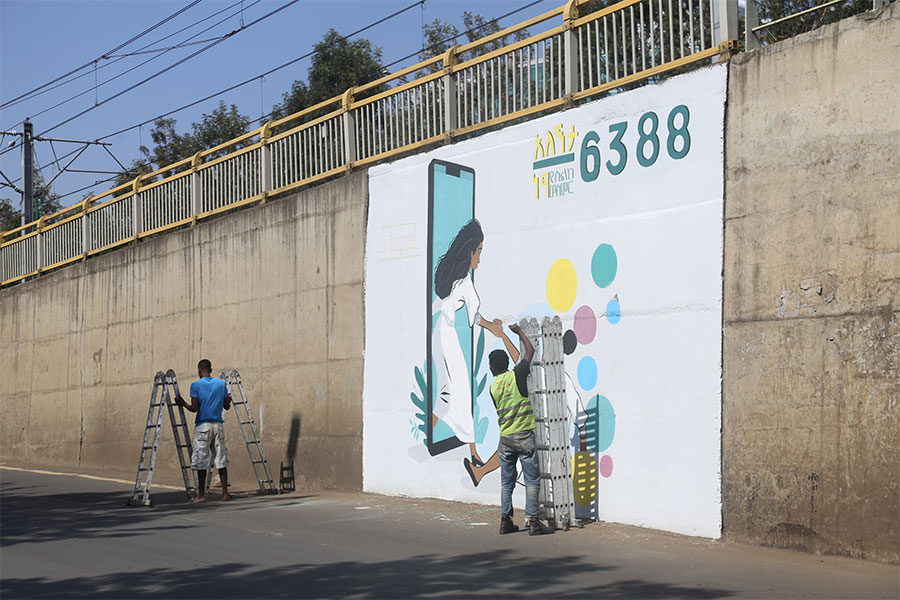
Mar 14 , 2020
By Eden Sahle ( Eden Sahle is founder and CEO of Yada Technology Plc. She has studied law with a focus on international economic law. She can be reached at edensah2000@gmail.com. )
The news of the month is the outbreak of the Novel Coronavirus Disease 2019 (COVID-19), which has taken over 4,000 lives, infected over 100,000 people and created a public health crisis in countries that were supposed to have advanced health systems. It has also caused a global pandemic of fear, leading to market declines across the world.
The world is terrified, and Ethiopia is no less worried. Although no suspected cases have come back positive in the country thus far, we need to be vigilant. We cannot have a business-as-usual attitude, especially considering the fact that our health system infrastructure is grossly inadequate.
The number of medical doctors per capita in Ethiopia is one of the lowest in the world; basic nutrition is largely unmet; and medical supplies, including gloves, face masks and antiseptics, are not easy to come by. It is not uncommon to observe long queues of patients waiting to get a single doctor to attend to their medical needs.
And this is just in urban areas. In the countryside, doctors put their lives on the line each day without basic supplies to keep themselves and their patients safe from infection.
The consequences of these shortcomings will be severe and far-reaching in the event COVID-19 devolves into a pandemic. This is not to mention the complications that could be caused by the lack of a clear legal system that obliges healthcare organisations to offer treatment when the safety of the public is in danger.
To give credit to Ethiopia’s government, there have been efforts toward mitigating the impact the disease can have if it ever comes to the country. Emergency centres have been established at Ethiopian Airlines, Tikur Anbessa, St. Paul and Kotebe hospitals, as well as all of the regional states. Around 3,000 face masks have also been distributed across the country.
No doubt, these measures are not enough in the event of a pandemic, but they are positive steps being taken despite the fact that there is, as of now, no one diagnosed with the disease. The greatest attention should be paid to awareness creation, which is crucial, because prevention is always far more successful in terms of saving lives and cost-effectiveness than having to deal with the disease once many have been infected.
Governments of countries around the world are warning the public to check into healthcare facilities if they experience flu-like systems. The government of Ethiopia has also been trying to create public awareness of the disease through short message service (SMS). But it is questionable how effective this initiative will be given that only a portion of the population owns cell phones, and literacy levels are low compared to other countries.
This is especially crucial considering our context. Coronavirus transmits through respiratory droplets released when an infected person coughs or sneezes. It also spreads rapidly between people who are in close contact, through handshakes, for example, and symptoms can occur within an average of five days.
Ethiopia's high population density and our culture's traditions of eating together and greeting one another makes us vulnerable to the disease. The Ministry of Health should create widespread education programmes, preferably on radio and TV, cautioning the public to change some social norms until the risk of COVID-19 has subsided.
Ethiopia may have tightened health controls at Bole International Airport and at border stations, but we are falling short of what other African countries, such as Rwanda, are doing to keep their public safe. This includes placing mobile hand washing facilities in public places.
The spread of this virus can be significantly slowed or even reversed through the implementation of the robust control measures the World Health Organisation (WHO) has put in place.
The Ministry of Health (MoH) should closely work with religious institutions, schools, universities and private companies to identify possible cases and to quickly bring them to care.
Neglecting public campaigns in the context of a severely fragile healthcare system can have enormous consequences. It is time for a massive public campaign to significantly advance the prevention mechanisms that will result in greater protection for the public and the country. The MoH should work to achieve these goals by supporting and improving information channels to the public.
PUBLISHED ON
Mar 14,2020 [ VOL
20 , NO
1037]

My Opinion | Jun 01,2019

Radar | Apr 17,2020

Radar | May 29,2021

Viewpoints | Oct 24,2020

In-Picture | Apr 27,2025

Life Matters | Jun 07,2025

Verbatim | Apr 04,2020

Commentaries | Aug 07,2021

Radar | Apr 24,2023

Editorial | Jun 05,2021

Dec 22 , 2024 . By TIZITA SHEWAFERAW
Charged with transforming colossal state-owned enterprises into modern and competitiv...

Aug 18 , 2024 . By AKSAH ITALO
Although predictable Yonas Zerihun's job in the ride-hailing service is not immune to...

Jul 28 , 2024 . By TIZITA SHEWAFERAW
Unhabitual, perhaps too many, Samuel Gebreyohannes, 38, used to occasionally enjoy a couple of beers at breakfast. However, he recently swit...

Jul 13 , 2024 . By AKSAH ITALO
Investors who rely on tractors, trucks, and field vehicles for commuting, transporting commodities, and f...

Jul 12 , 2025
Political leaders and their policy advisors often promise great leaps forward, yet th...

Jul 5 , 2025
Six years ago, Ethiopia was the darling of international liberal commentators. A year...

Jun 28 , 2025
Meseret Damtie, the assertive auditor general, has never been shy about naming names...

Jun 21 , 2025
A well-worn adage says, “Budget is not destiny, but it is direction.” Examining t...